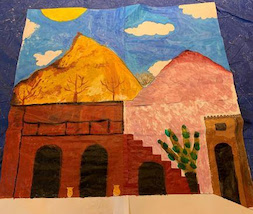Over the last few weeks my time at common art has began to wrap up as I prepare for the end of my internship. It feels like the past month has gone by so fast and has been filled with countless learning opportunities.



Over the last few weeks my time at common art has began to wrap up as I prepare for the end of my internship. It feels like the past month has gone by so fast and has been filled with countless learning opportunities.

 Since it was my first time painting pieces for a set, for the sake of time and in order to include more painters, I sketched out the setting of Jerusalem on large white paper ahead of time. Then community members worked together to paint the scene with newly-returned acrylic paints. I worked with the playwright and community members to pick colors for each section of the painting.
Since it was my first time painting pieces for a set, for the sake of time and in order to include more painters, I sketched out the setting of Jerusalem on large white paper ahead of time. Then community members worked together to paint the scene with newly-returned acrylic paints. I worked with the playwright and community members to pick colors for each section of the painting.Over the past few weeks, I have found myself settling into new routines after the holidays and beginning of the New Year. Yet as we move into February, it has occurred to me that we are at the one-year mark of the Covid-19 pandemic in the United States. I’ve spent a lot of time thinking about how feelings about this anniversary will arise within community members and will show up in their art and their behavior.
One of my favorite things about Common Art is the way that the community members co-construct the space. Community members are involved in each step of the planning and execution of the programs if they choose. They aren’t just participants they are the what makes Common Art run each Wednesday. Continue reading